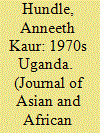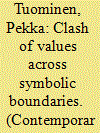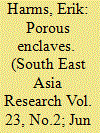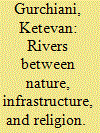| Srl | Item |
| 1 |
ID:
159772


|
|
|
|
|
| Summary/Abstract |
This paper explores the ongoing presence of the 1972 expulsion of the racialized Asian population by former president Idi Amin in contemporary Uganda. The expulsion was a “critical event” and thus the paper uses an “anthropology of the event” approach to focus on the architecture of silence and historical consciousness of the event in urban Kampala. The four arenas of focus are: (1) official state narratives; (2) community mobilization and public forums on urban African-Asian relations; (3) memories, adventure tales, and narratives expressed by Ugandan Asian men; and (4) the infrastructure and material culture of 1970s Asian property expropriation.
|
|
|
|
|
|
|
|
|
|
|
|
|
|
|
|
| 2 |
ID:
119172


|
|
|
| 3 |
ID:
140849


|
|
|
|
|
| Summary/Abstract |
Cities across Asia are increasingly dotted with large, upmarket, seemingly homogeneous and avowedly exclusive master-planned, mixed-use housing and commercial developments. From an outsider's perspective, these projects appear starkly uniform and to have been imposed on urban landscapes with little attempt to integrate them into local social, cultural and economic contexts. Recent research in South East Asia, however, shows how these developments are not in fact hermetically sealed from the surrounding world. Instead, they may be productively understood as 'porous enclaves', spaces marked not only by exclusion but by social interaction that cuts across the interfaces of inside and outside, public and private, city and country and local and foreign – all categories presumed to be kept separate in many modern city plans. This introductory article to this special issue on 'Porous enclaves' highlights new research at the interface of the porous city and the enclave, and calls on urban studies scholars to pay close attention to the social life within and among the porous enclaves that have emerged in South East Asia.
|
|
|
|
|
|
|
|
|
|
|
|
|
|
|
|
| 4 |
ID:
191074


|
|
|
|
|
| Summary/Abstract |
Focusing on the domestication and undomestication of nature around the River Vere in Tbilisi, Georgia, this article analyses how modernization projects seemingly overcoming nature simultaneously reinforced the complex entanglement between nature and infrastructure, the material and immaterial, the human and non-human. The article centres around a flooding event in 2015, shedding light on the entanglement of different approaches and temporalities. The river and its infrastructure are caught up with ideas, beliefs and materialities. The paper analyses how the crisis gave rise to questions about ‘morality’ of materiality, ‘proper’ and ‘improper’ handling of nature. Based on ethnography and archival work, it shows how the infrastructural developments conceived as projects of Soviet atheist modernity emerged as sites where nature, technologies and religion meet. Rather than looking at Soviet and post-Soviet as two different modernities, the article shows them as continuities.
|
|
|
|
|
|
|
|
|
|
|
|
|
|
|
|